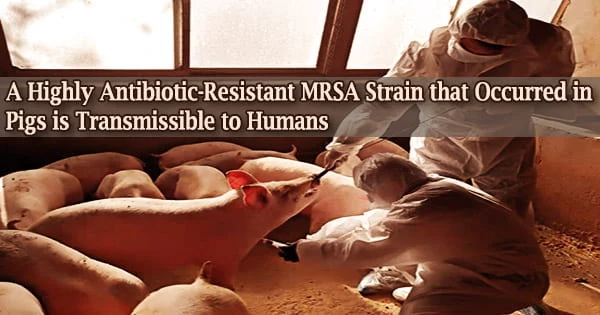According to a recent study, pig farming’s widespread use of antibiotics has likely contributed to the emergence of a highly antibiotic-resistant strain of the superbug MRSA, methicillin-resistant Staphylococcus aureus, in swine over the past 50 years.
Over the past fifty years, the strain, known as CC398, has supplanted other MRSA strains in animals across Europe. It is also a rising source of MRSA infections in people.
According to the study, CC398 has remained resistant to antibiotics in pigs and other livestock for many years. Furthermore, it can quickly adapt to human hosts while still preserving its antibiotic resistance.
The findings demonstrate the possible risk that this MRSA strain poses to the general public’s health. Both those who have and those who have not had direct contact with livestock have been linked to an increase in human infections.
“Historically high levels of antibiotic use may have led to the evolution of this highly antibiotic-resistant strain of MRSA on pig farms,” said Dr. Gemma Murray, a lead author of the study, previously in the University of Cambridge’s Department of Veterinary Medicine and now at the Wellcome Sanger Institute.
She added: “We found that the antibiotic resistance in this livestock-associated MRSA is extremely stable it has persisted over several decades, and also as the bacteria has spread across different livestock species.”
European livestock now uses significantly fewer antibiotics than in the past. However, the researchers claim that because this strain of MRSA is so stable, continued cuts in antibiotic usage on pig farms as a result of recent legislative changes are expected to have a minimal impact.
Despite being present in a wide variety of livestock species, CC398 associated with livestock is most frequently found in pigs. Particularly striking evidence of its spread may be found in Danish pig farms, where the proportion of MRSA-positive herds has surged from less than 5% in 2008 to 90% in 2018. Pigs are not sickened by MRSA.
“Understanding the emergence and success of CC398 in European livestock and its capacity to infect humans is vitally important in managing the risk it poses to public health,” said Dr. Lucy Weinert in the University of Cambridge’s Department of Veterinary Medicine, senior author of the paper.
Historically high levels of antibiotic use may have led to the evolution of this highly antibiotic-resistant strain of MRSA on pig farms.
Dr. Gemma Murray
Three mobile genetic elements found in the MRSA genome have been connected to the success of CC398 in cattle and its capacity to infect people. These are sections of the MRSA’s genetic code that give it properties like antibiotic resistance and the capacity to elude the human immune system.
Two specific mobile genetic components, Tn916 and SCCmec, which confer antibiotic resistance in MRSA, have an evolutionary history that was reconstructed by the researchers. They discovered that these elements had remained in CC398 in pigs for decades in a stable manner. Additionally, they survive when CC398 transfers significant amounts of resistance to common antibiotics used in agriculture to humans.
On the other hand, it was discovered that Sa3, a third mobile genetic component that helps the CC398 strain of MRSA avoid the human immune system, regularly vanished and then returned over time, in both CC398 associated with humans and CC398 linked with cattle. CC398 may be able to quickly adapt to human hosts, according to this.
“Cases of livestock-associated MRSA in humans are still only a small fraction of all MRSA cases in human populations, but the fact that they’re increasing is a worrying sign,” said Weinert.
Concerns regarding livestock serving as reservoirs for antibiotic-resistant human diseases have grown as a result of the intensification of farming and high levels of antibiotic use in livestock.
For many years, pig farms have utilized zinc oxide to stop piglets’ diarrhea. The European Union will outlaw its usage as of this month due to worries about its effects on the environment and its propensity to encourage antibiotic resistance in cattle.
The genes that confer antibiotic resistance are not always connected to the genes that confer resistance to zinc therapy, according to the authors, thus this prohibition might not help lower the prevalence of CC398.
In human patients, MRSA was first discovered in 1960. It is far more difficult to treat than other bacterial illnesses due to its resistance to medications. MRSA is currently one of the biggest risks to human health in the globe, according to the World Health Organization (WHO).





